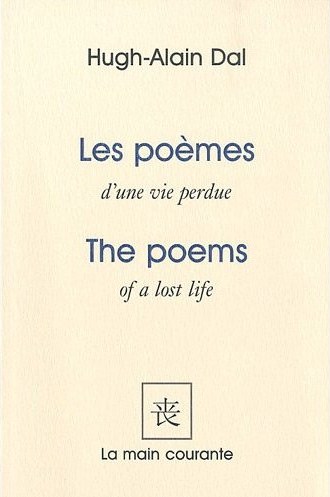If there was not a copy of the first issue of Janus available for sale on the web, dated March 1950 & with contributors that include Paul Valery & LS Senghor as well as Hugh-Alain Dal, I might be inclined to think that Dal was an Ern Malley / Araki Yasusada type heteronym, a poet invented by his translators Antoine Bargel & Thomas Rain Crowe for their bilingual edition of Les poems d’un vie perdue / The poems of a lost life, published by La Main Courante in La Souterraine, France, with a preface by Jean-Michel Renaitour from a 1949 volume whose French title is translated as Why I am a Monster, and with a brief preface by Pierre Courtaud. As I understand it, Dal published after the Second World War up until 1950 or 1951, then stopped altogether. Renaitour’s preface makes clear that Dal was born around 1929, but little else appears to be known about him.
Dal is a neglectorino whose one-book-and-done career fits a pretty standard pattern, the young writer whose output marks a specific moment in an author’s life (which for the most part turns out not to have been the life of an author). It’s not that far removed from the story of any young MFA student who stops writing the minute he or she leaves school. Without the context in which the writing itself was being produced, it can be difficult for a young person especially to sustain that momentum in the face of what may feel like the world’s stunning indifference to one’s work. Whatever the circumstances in Dal’s case, Les poems d’une vie perdue is an apt title for this curious gathering.
Curious in the sense that Dal’s poetry doesn’t really fit in with the best post-war French poetry, the work, say, of René Char, Francis Ponge or Jacques Prévert. Regardless of their individual aesthetic allegiances, these poets – and many of their peers in liberated France – all brought a new, quieter tone to their writing in the devil-may-care avant-gardism of the 1920s & ‘30s. The elevated rhetoric & histrionic tones one associates with classical surrealism (now there’s a concept) may have felt preposterous in the wake of the literal extremism that was the routinized mass murder of the Nazis. Not Dal, though. He writes, one might say, as though the Second World War were in the future:
I have torn away my hands to give them to you.
They are dead.
They are rotten.
Or
It stole yesterday into Paris.
Autumn!
Or
I know that the spiders are coming…
That they will write poems on the ceiling in Latin.
That they will guzzle me
the head,
the body,
the soul!
He who doesn’t like spiders can tell you more.
The humor in that last line – the only one of these excerpts that quotes a poem in full – suggesting as it does that the speaker likes what the spiders are doing to him, is what distinguishes Dal from mere student work, surrealism copied rather than earned. There is a spark to these poems that keeps me interested in ways I seldom find in the second-tier American surrealists of the 1950s, the sort of work that cluttered up journals like The Fifties or Kayak, but there’s also that heightened rhetoric that in that same period showed up in the U.S. in some unusual places – the work of Philip Lamantia, for example, or some of the writing of the Franklin Rosemont circle. That Lamantia echo (which I take to be totally happenstance, Lamantia & Dal picking up on the same vibe in the culture) may actually be what a poet like Thomas Rain Crowe responds to in this work, or at least why.
Dal feels to me similar to a lot of younger poets in that he’s not so much a forger of new things (no Rimbaud he) as a close reader of what already exists ahead of him, which explains why he carries that prewar feel. Think of Williams’ Keats period or Creeley’s For Love. And what Dal is looking at is largely prewar avant-garde French writing. But this is the problem of the one-and-done career. A Creeley who stopped with For Love would have a very different type of reader today than those to whom his work has meant so much. Imagine a Williams who stopped with the Keats imitations – him we wouldn’t read at all anymore. We will never know just who Hugh-Alain Dal might have become.
But it seems inherently useful to me not to have only the great works of a given nation translated, only the Char, only the Ponge. Particularly from a literature that is so widely available (which is not to say widely enough – there are still gaps) as that of France, it makes sense to give a fuller panorama of the entire scene, and Dal helps us to make sense of his period in rather the same way that, say, a reader of Ray Bremser will have a fuller picture of American poetry in the 1950s than someone who has never heard the name.
This isn’t precisely an argument for the work as such. But it is an argument for the work in context, and for the light (and shadow) it throws on everything in its vicinity. Would that folks took such heed & care with our own neglectorinos.






